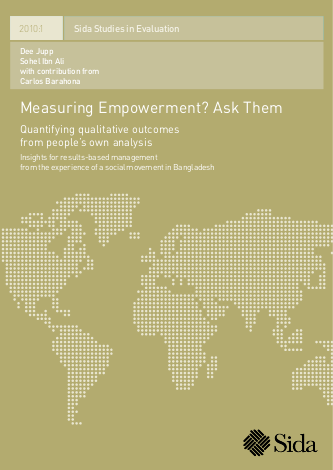
This publication suggests that steps in the process of attainment of rights and the process of empowerment are easy to identify and measure for those active in the struggle to achieve them. It is our etic perspectives that make the whole thing difficult. When we apply normative frames of reference, we inevitably impose our values and our notions of democracy and citizen engagement rather than embracing people’s own context-based experience of empowerment. This paper presents the experience of one social movement in Bangladesh, which managed to find a way to measure empowerment by letting the members themselves explain what benefits they acquired from the Movement and by developing a means to measure change over time. These measures, which are primarily of use to the members, have then been subjected to numerical analysis outside of the village environment to provide convincing quantitative data, which satisfies the demands of results-based management.
The paper is aimed primarily at those who are excited by the possibilities of rights-based approaches but who are concerned about proving that their investment results in measurable and attributablemchange. The experience described here should build confidence that transparency, rigour and reliability can be assured in communityled approaches to monitoring and evaluation without distorting the original purpose, which is a system of reflection for the community members themselves. Hopefully, the reader will feel empowered to challenge the sceptics.